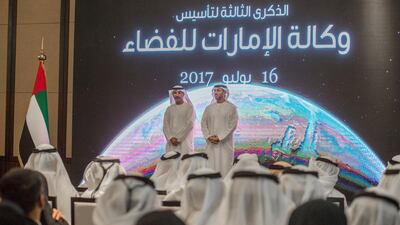The UAE Space Agency, three years on from its inception, is entering a critical phase where it needs to recruit more Emiratis into the sector from a young age.
With two academic institutes already on-board in offering space-related curricula - the Masdar Institute of Science and Technology and the American University of Ras Al Khaimah - another eight are planned across the country.
“Space is key for our future and it can be utilised to inspire and improve our [performance] and to change the region’s [image] in the eyes of the world,” said Dr Mohammed Al Ahbabi, the agency’s director general.
“That’s through projects in science and technology, which help to diversify our economy. It has become a tool to help and support the future economy away from oil.”
The agency is hoping to attract more young Emiratis to Stem programmes. In Dubai, 70 per cent of students choose courses related to commerce instead of Stem, even though Stem could lead them to a variety of careers. There are 30 or so universities in the emirate offering a choice of more than 400 academic programmes, so competition to attract talent is fierce.
“If we want to match the Government’s objectives, we have to work on the future workforce,” Dr Al Ahbabi said. “A space programme without talented, skilled people is not complete. You need to bring them to the first step then they will be on-board.”
The agency’s research centre set up at UAE University in Al Ain at the end of last year, and the university now plans to establish the first space degree - but there is a need for more.
“There’s a master’s degree in space systems and technology at Masdar and the first batch graduated last year,” he said. “It’s unique because they’re doing some educational curriculum and practical work where they design and implement a cubesat, which is a small satellite that will be launched in the future.”
Building small satellites is made available for undergraduates close to finishing their degree and master’s students.
“It’s the best tool to educate people because you involve them in the designing and manufacturing,” Dr Al Ahbabi added. “The concept of a satellite is the same - whether 1kg or 1 tonne – you can use it for something good and we will open competitions among students to try to find a useful usage of that satellite.”
Agency chairman and Minister of State for Higher Education Dr Ahmad Al Falasi said the agency is at the start of a new chapter of innovative initiatives. “This requires enhancing current and future industry capabilities,” he said. “That includes fostering space research and development centres and further developing advanced capability-building programmes”.
New programmes will focus on astrophysics, a major which has yet to be tapped into.
“The idea is we want to be able to fund projects in different universities and support students in learning about space and how they can use space education in making new discoveries,” said Sheikha Al Maskari, the agency’s chief innovation officer.
“Most academic institutes have engineering majors but not anything related to space, so we’re working on developing programmes for master’s degrees and we’ve already launched a masters in aviation and space law at Sharjah University. The trend right now is astrophysics and we need to look into that so we’re trying to get people into Stem – it’s about school foundation in the primary years to get them excited about sciences.”
The agency will focus more on academia to prepare the next generation of scientists, engineers and researchers.
“The next few years will involve helping pave the way towards Mars 2117, by when we plan to have an Emirati settlement on Mars,” said Ms Al Maskari. “It’s about training the right people and giving them the important information that will help them decide if they want to be in space, so we’re trying to encourage and motivate them to join it.”
The agency has so far signed 10 agreements with academic institutions. It is also hoping to attract more students into its local space summer camps while continuing its international camps in the United States, United Kingdom and Japan, with the potential to add Singapore.
“Hundreds of years ago, this region used to be a pioneer and then we went downwards,” Ms Al Maskari said. “So what we want to do is relive that legacy, be pioneers in sciences and able to give back to the world and to benefit humankind through our projects. We don’t want to be a passive player in the world, we want to be active and a key player.”

